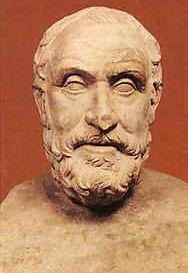Great Throughts Treasury
This site is dedicated to the memory of Dr. Alan William Smolowe who gave birth to the creation of this database.

Pyrrho (or Pyrrhon), aka Pyrrho of Elis NULL
Greek Skeptic Philosopher of Classical Antiquity, Painter, Inspired school of Pyrrhonism founded by Aenesidemus in the 1st century B.C.
"Custom and convention govern human activities."
"[Description from www.philosophybasics.com] The main principle of Pyrrho's thought can be expressed by the word "acatalepsia", which connotes the ability to withhold assent from doctrines regarding the truth of things in their own nature. He argued that we only know how things appear to us, but are ignorant of their inner substance, especially as the same thing can appear differently to different people. So, it is therefore impossible to know which opinion is right (the diversity of opinion among the wise, as well as among the vulgar, proves this). Thus, if a contradiction may be advanced against every statement with equal justification and no assertion can be known to be better than another, it is necessary to completely suspend judgment by asserting nothing definite and never making any positive statements on any subject, however trivial. By applying these ideas of what he called "practical skepticism" to Ethics and to life in general, Pyrrho concluded that the only proper attitude is "ataraxia" (which can be translated as "inner peace" or "freedom from worry" or "apathy"), which became the ultimate goal of the early Skeptikoi. He argued that, since nothing can be known, nothing can be in itself either good or evil, and it is only opinion, custom and law which makes it appear so. If there is no good reason to prefer one course of action to another, then the absence of all activity should be the ideal of the sage. In this apathy, he will renounce all desires (which are based on the untenable opinion that one thing is better than another), and will live in undisturbed tranquillity of the soul, free from all delusions. Unhappiness is the result of not attaining what one desires (or of losing it, once attained); thus, the wise person, being free from desires, is also free from unhappiness."